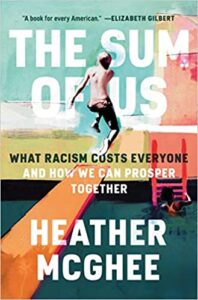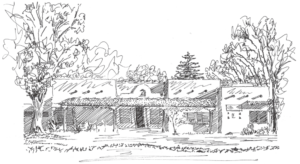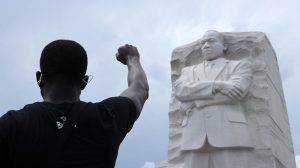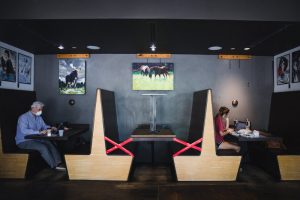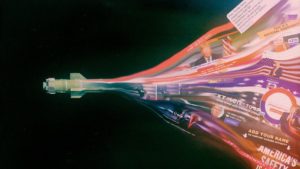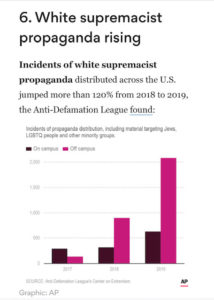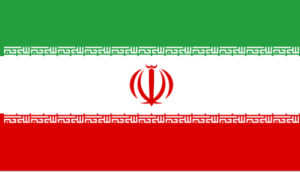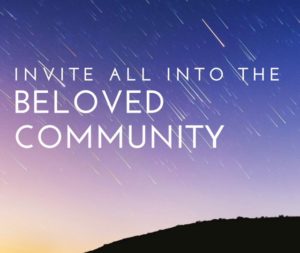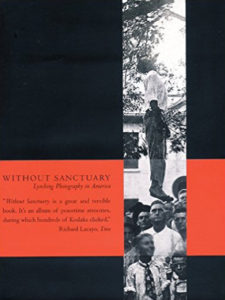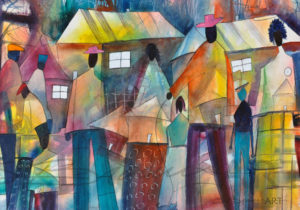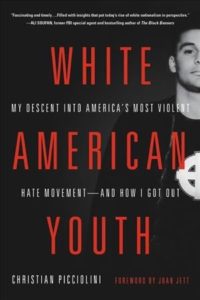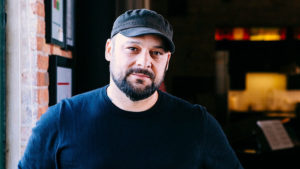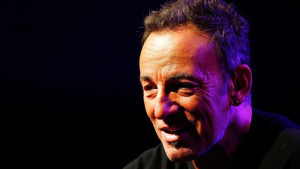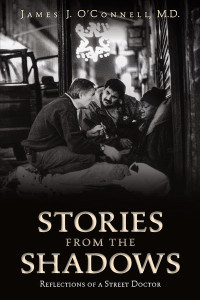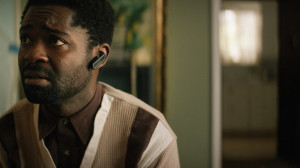Fresh Air
Past and Present. A community dialogue.
February 21, 2021To understand the world knowledge is not enough, you must see it, touch it, live in its presence.
—Teilhard de Chardin, Hymn of the Universe
The American Lie.
No. Not the election.
The big lie in the United States is racism only effects people of color.
Heather McGhee’s book is brilliant. She is brilliant. Her book is incredibly researched and synthesized. A must read book for every journalist, politician, policy creator, and student. Actually, you know what? Everyone should read Heather’s book. And she speaks like she writes, clearly, foundationally, and directly. We need to listen. -dayle
NPR/Fresh Air
The heart of McGhee’s case is that racism is harmful to everyone, and thus we all have an interest in fighting it. Drawing on a wealth of economic data, she argues that when laws and practices have discriminated against African Americans, whites have also been harmed. When people unite across racial and ethnic lines, she argues, there’s a solidarity dividend that helps everyone.
Heather McGhee is the former president of the progressive think tank Demos, where she spent much of her career. She holds a BA in American Studies from Yale and a law degree from the University of California, Berkeley. She currently chairs the board of Color of Change, a nationwide online racial justice organization. Her new book is “The Sum Of Us: What Racism Costs Everyone And How We Can Prosper Together.”
Heather McGhee:
This to me is really the kind of parable at the heart of the book. It’s what’s illustrated on the cover. In the 1920s, ’30s and ’40s, the United States went on a building boom of these grand resort-style swimming pools. These were the kind that would hold hundreds, even thousands, of swimmers. And it was a real sort of Americanization project. It was to create a, like, bath-temperature melting pot of, you know, white ethnic immigrants and people in the community to come together. It was sort of a commitment by the government to a leisure-filled American dream standard of living. And in many of these public pools, the rule was that it was whites only, either officially or unofficially. And in the 1950s and ’60s when Black communities began to, understandably, say, hey, it’s our tax dollars that are helping to support this public good, we need to be allowed to swim, too, all over the country, particularly in the American South but in other places as well, white towns facing integration orders from the courts decided to drain their public swimming pools rather than let Black families swim, too.
Now, I went to Montgomery, Ala., where there used to be one of those grand resort-style pools and where effective January 1, 1959, not only did they back a truck up and pour dirt into the pool and pave it over, but they also sold off the animals in the municipal zoo. They closed down the entire parks and recreation department of Montgomery for a decade. It wasn’t until almost 1970 that they reopened the park system for the entire city. And I walked the grounds of Oak Park. Even after they reopened it, they never rebuilt the pool. And that, to me, felt like this just tangible symbol of the way that a population taught to distrust and disdain their neighbors of color will withdraw from public goods when they no longer see the public as good.
Interview with Dave Davies on NPR:
https://www.npr.org/2021/02/17/968638759/sum-of-us-examines-the-hidden-cost-of-racism-for-everyone
The Daily Show with Trevor Noah
“The Sum of Us,” and underlines the importance of having honest conversations about past and present racism at a community level.
Ezra Klein/NYTimes
What ‘Drained-Pool’ Politics Costs America
I asked McGhee to join me on my podcast, “The Ezra Klein Show,” for a discussion about drained-pool politics, the zero-sum stories at the heart of American policymaking, how people define and understand their political interests, and the path forward. This is, in my view, a hopeful book, and a hopeful conversation. There are so many issues where the trade-offs are real, and binding. But in this space, there are vast “solidarity dividends” just waiting for us, if we are willing to stand with, rather than against, each other.
Also from the NYTimes.
opinion
The book That Should Change How Progressives Talk About Race
Heather McGhee writes that racism increases economic inequality for everyone.
by Michelle Goldberg
McGhee’s book is about the many ways racism has defeated efforts to create a more economically just America. Once the civil rights movement expanded America’s conception of “the public,” white America’s support for public goods collapsed. People of color have suffered the most from the resulting austerity, but it’s made life a lot worse for most white people, too. McGhee’s central metaphor is that of towns and cities that closed their public pools rather than share them with Black people, leaving everyone who couldn’t afford a private pool materially worse off.
One of the most fascinating things about “The Sum of Us” is how it challenges the assumptions of both white antiracism activists and progressives who just want to talk about class. McGhee argues that it’s futile to try to address decades of disinvestment in schools, infrastructure, health care and more without talking about racial resentment.
[…]
“Communicators have to be aware of the mental frameworks of their audience,” McGhee told me. “And for white Americans, the zero-sum is a profound, both deeply embedded and constantly reinforced one.”
This doesn’t mean that the concept of white privilege isn’t useful; obviously it describes something real. “What privilege awareness does, at its best, is reveal the systematic unfairness, and lift the blame from the victims of a corrupt system,” McGhee said. “However, I think at this point in our discourse — also when so many white people feel deeply unprivileged — it’s more important to talk about the world we want for everyone.”
Center for Action and Contemplation in Albuquerque, New Mexico.
Theologian Howard Thurman, from Walter Brueggemann, The Message of the Psalms: A Theological Commentary [1984].
Thurman takes what is personal and makes it universal. Walter Brueggemann calls this “the scandal of particularity.” [1] We “get it” in one ordinary, concrete moment and wrestle and fall in love with it there. It’s a scandal precisely because it’s so ordinary. What is true in one place finally ends up being true everywhere.
From Barbara Holmes and her lecture Race and the Cosmos, unpublished Living School curriculum.
As I considered it, the truth of the matter was that we were living within an old story; and a new story needed to be told, but we didn’t have the language for it.
The old story was of victimization, marginalization, oppression, oppressors; and the new story would see all of us evolving, self-expanding, and finding a new place in this wonderful cosmology that is a reality we have not paid attention to. So, in order to get to that point—and here is where my transformation begins—I had to reconsider what I thought about people, because I had hardened my view of others and who they were and what they meant. I had spent my time raising two little African American boys who had to be taught how to survive in society. In doing that, I taught them to view the world in only one way; and I myself was hardened into a position that either you were with me or you were against me or us.
All of that had to change. I had to begin to think of us as spiritual beings having a human experience, and not bodily, embodied folks without spirit or soul. . . . That’s a very limited view of humankind, and I wanted to expand the story. . . .
The physics and cosmology revolution that is 100 years old has not been translated into the ordinary world of any of us, and specifically not in communities of color. The world that scientists describe now is so different than the world that I grew up in or even imagined. According to physicists, this is what the world is like: it is a universe permeated with movement and energy that vibrates and pulses with access to many dimensions. . . . We are all interconnected, not just spiritually or imaginally, but actually . . . and the explicate [or manifested] order that’s all around us makes us think that we’re separate. Finally, I learned that ideas of dominance are predicated on a Newtonian clockwork universe. So, like dominoes, you push one and they all fall down, and everything is in order. But quantum physics tells us that the world is completely different. Particles burst into existence in unpredictable ways, observations affect the observed, and dreams of order and rationality are not the building blocks of the universe.
A compilation piece: 2-part documentary on PBS, The Black Church: This Is Our Story, This Is Our Song, from executive producer, host, and writer Henry Louis Gates, Jr.
It traces the 400-year-old story of the Black church in America, all the way down to its bedrock role as the site of African American survival and grace, organizing and resilience, thriving and testifying, autonomy and freedom, solidarity and speaking truth to power.
It is now available online.
https://www.pbs.org/show/black-church/
Cicely Tyson December 19, 1924 – January 28, 2021
Kennedy Center Honors, December 2015.
Constitution crisis?
October 29, 2020We could be close. It’s important for us to understand how a crisis could unfold and what we can do.
This TED Talk was recorded three days ago with CNN political Commentator Van Jones.
“If the 2020 US presidential election is close, the race could drag on in the courts and halls of Congress long after ballots are cast, says lawyer and political commentator Van Jones. Explaining why the customary concession speech is one of the most important safeguards for democracy, Jones exposes shocking legal loopholes that could enable a candidate to grab power even if they lose both the popular vote and the electoral college — and shares what ordinary citizens can do if there’s no peaceful transfer of power.”
[16:00]
It is truly remarkable how are elections are foundational to norms and behaviors, not necessarily names in the Constitution. A very real concern could be the ‘private armed militia’ Jones draws reference to. To learn more about a growing militia group featured on a recent episode of Fresh Air, follow this link:
https://www.npr.org/2020/10/26/927796915/pro-trump-militias-election-day-beyond
‘Atlantic’ writer Mike Giglio profiles the Oath Keepers, a pro-Trump militia group, in a new article. They have recruited thousands of police, soldiers and veterans. We talk about what they might do on Election Day and after. “We, as Americans, are so comfortable with the idea of sending people out into foreign wars. And now [these militia groups are] starting to look at America itself as a part of that battle space.” Giglio also shares insights from covering civil wars overseas.
[Dr. Strangelove]
Another podcast I listened to recently…Radiolab…explains Constitutional crisis following ‘what if’ scenarios with a group of experts and political operatives who play these types of ‘war games.’
There’s plenty of speculation about what Donald Trump might do in the wake of the election. Would he dispute the results if he loses? Would he simply refuse to leave office, or even try to use the military to maintain control? Last summer, Rosa Brooks got together a team of experts and political operatives from both sides of the aisle to ask a slightly different question. Rather than arguing about whether he’d do those things, they dug into what exactly would happen if he did. Part war game part choose your own adventure, Rosa’s Transition Integrity Project doesn’t give us any predictions, and it isn’t a referendum on Trump. Instead, it’s a deeply illuminating stress test on our laws, our institutions, and on the commitment to democracy written into the constitution.
This episode was reported by Bethel Habte, with help from Tracie Hunte, and produced by Bethel Habte. Jeremy Bloom provided original music.
[41:00]
https://www.wnycstudios.org/podcasts/radiolab/articles/what-if
#MustListen
June 25, 2020NPR
A Call for Reparations: How America Might Narrow the Racial Wealth Gap
Pulitzer Prize-winning journalist Nikole Hannah-Jones on the racial wealth gap — and why she believes it’s time for reparations. Her new piece published in New York Times magazine.
The killing of George Floyd has ignited protests and inspired conversations — and changes — across the globe. But New York Times Magazine writer Nikole Hannah-Jones says more needs to be done to address America’s racial wealth gap.
“Very few Americans have created all of their wealth on their own; it’s passed down through generations and then built upon,” Hannah-Jones says. “Black Americans never really had a chance to do that.”
Hannah-Jones traces the wealth gap to slavery, and the fact that enslaved people were not allowed to own property. She notes that the legalized segregation and racial terrorism that followed slavery exacerbated the problem and “prevented generation after generation of Black Americans from acquiring the type of wealth or foothold in the economy that allows you to live a life that is much more typical of white Americans.”
Hannah-Jones won a Pulitzer Prize for creating the 1619 project at The New York Times, which tracks the legacy of slavery. Her latest article for the Times Magazine, What is Owed, makes the case for economic reparations for Black Americans.
Nikole Hannah-Jones:
Very few Americans have created all of their wealth on their own; it’s passed down through generations and then built upon. Black Americans never really had a chance to do that.
There are stories of mass starvation of Black people after they had been freed, having to leave the plantation and find shelter in burned out buildings, trying to forage for food in burned-out fields. It was a devastating period for Black people. This country decided that it was going to do nothing, that it owed these people nothing.
“We’re no where near getting on top of this virus right now.”
April 30, 2020FRESH AIR
NPR
A booth was taped off to ensure social distancing at a coffee shop in Woodstock, Ga., on Monday, as Gov. Brian Kemp eased restrictions in the state and allowed dine-in service. Dustin Chambers/Bloomberg via Getty Images
Compared With China, U.S. Stay-At-Home Has Been ‘Giant Garden Party,’ Journalist Says
“A pattern of infections and restrictions that could last for years.”
“In this country, 30,000 + new infections every day.”
“China didn’t start easing restrictions until they had Zero new infections a day…that’s when you really have control with easier contact-tracing.”
–New York Times science and health reporter Donald G. McNeil Jr.
McNeil says even a fairly strict stay-at-home policy is “just the first step” in the battle against the pandemic: “There’s a Harvard study that came out recently that said we should have 5 million to 10 million tests per day across [the U.S.] in order to have a clearer idea of where the virus is, where cases are going up. And cumulatively, all the tests we’ve done now has been 5 million.”
On how testing worked in China
The model in China was, when it was time to be tested, you were taken to a fever clinic. You were screened in several ways: Your temperature was taken. You were given a quick flu test and a quick white blood cell count to make sure you didn’t have a flu or bacterial pneumonia. And then you’d be given a quick CT scan. They could run as many as 200 CT scans a day on some of these portable machines so that they could check your lungs — because their tests had some time before the results came back too. And only after you cleared all those hurdles and you were definitely still a COVID case, then you got the test, because their tests were imperfect like ours are. And then you didn’t go home to wait for the results of your test. You stayed there in the fever clinic, in the center. You were told to sit far apart from other people — 6 feet away from other people. And people sat there sort of scared with their envelopes with their CT scan results in their hands, waiting to hear if they were yes or no.
On what might happen if the U.S. reopens too quickly
If we all went back into baseball stadiums and churches and piled into grocery stores and got onto the subway, everything would be quiet for about two weeks, and then, whammo! You’d see temperatures go up on the Kinsa app, and then you’d see positive tests go up, and then you’d see hospital admissions go up. And then you’d see people being transferred into ICUs go up — and then you’d see deaths. We’d be on our way back to [previous predictions of] 1.6 to 2.2 million deaths [in the U.S. because of COVID-19 again.
This is probably going to be a series of steps. We’re going to have to do this again and again, dancing in and dancing out until we get to the point where we either have a vaccine or a prophylactic pill or some regimen — some curative regimen that’s so good that we’re confident that, if I get sick, maybe I get sick, but if I crash, I can count on being saved.
On ways in which the pandemic might change our country for the better
This is like going through a war. And if we went through World War I and World War II, and after each of those wars, we tried to create the League of Nations, and we did create the United Nations. People saw that we were all in this together, and the attitudes changed after those wars. Unions were strengthened. Incomes became more level. People had had it with war profiteers, and taxes on the rich went up.
It led to the GI Bill and the Veterans Administration mortgages. In Europe, the widows’ and orphans’ pension funds led to the creation of the famous European social safety net. [They were] a very equalizing kind of events. And I’m hoping that something like that will happen in this country too, that we’ll have kind of a rosy outcome from this and that people will value life more.
You heard it in Wuhan. People came out after two months in hiding, and they said, “My God, the flowers are so beautiful. I’ve never really noticed before.” I think people will take more pleasure in the simple things in life and feel lucky that they got through this.
So I’m hoping we have a brighter dawn, but we’re going to go through some pain first. But then that’s one of the reasons I stay relatively optimistic about this, because I can see maybe a better country emerging from this.
#MustRead ~ Information Ecosystem
February 12, 2020Truths kindle light for truths.
-Julius Caesar
“What you have is a presidential campaign that is pushing lies and distortions and conspiracy theories into the bloodstream at an unprecedented rate,” says Atlantic writer McKay Coppins.
“Eventually, the fear of covert propaganda inflicts as much damage as the propaganda itself.”
The Atlantic
The Billion-Dollar Disinformation Campaign to Reelect the President
How new technologies and techniques pioneered by dictators will shape the 2020 election
“One day last fall, I sat down to create a new Facebook account. I picked a forgettable name, snapped a profile pic with my face obscured, and clicked “Like” on the official pages of Donald Trump and his reelection campaign. Facebook’s algorithm prodded me to follow Ann Coulter, Fox Business, and a variety of fan pages with names like “In Trump We Trust.” I complied. I also gave my cellphone number to the Trump campaign, and joined a handful of private Facebook groups for MAGA diehards, one of which required an application that seemed designed to screen out interlopers.
It’s been reported that the RNC and the Trump campaign have compiled an average of 3,000 data points on every voter in America. And so that means everything from what you like to watch on TV, what kind of stores you shop at, whether you’ve been to a gun show or own a gun. They’ve compiled all this data, and they can use it to carefully tailor messages just for you. And I should say that this is not unique to the Trump campaign. This isn’t something Brad Parscale invented. Barack Obama’s campaign famously did it in 2012. The Clinton campaign did it as well in 2016. But the Trump campaign’s effort was different, both because it was much more extensive and also, frankly, a lot more brazen.
The Trump campaign is planning to spend more than $1 billion, and it will be aided by a vast coalition of partisan media, outside political groups, and enterprising freelance operatives. These pro-Trump forces are poised to wage what could be the most extensive disinformation campaign in U.S. history. Whether or not it succeeds in reelecting the president, the wreckage it leaves behind could be irreparable.”
The Death Star
The campaign is run from the 14th floor of a gleaming, modern office tower in Rosslyn, Virginia, just outside Washington, D.C. Glass-walled conference rooms look out on the Potomac River. Rows of sleek monitors line the main office space. Unlike the bootstrap operation that first got Trump elected—with its motley band of B-teamers toiling in an unfinished space in Trump Tower—his 2020 enterprise is heavily funded, technologically sophisticated, and staffed with dozens of experienced operatives. One Republican strategist referred to it, admiringly, as “the Death Star.”
Next hit? Local News
Parscale has indicated that he plans to open up a new front in this war: local news. Last year, he said the campaign intends to train “swarms of surrogates” to undermine negative coverage from local TV stations and newspapers. Polls have long found that Americans across the political spectrum trust local news more than national media. If the campaign has its way, that trust will be eroded by November. “We can actually build up and fight with the local newspapers,” Parscale told donors, according to a recording provided by The Palm Beach Post. “So we’re not just fighting on Fox News, CNN, and MSNBC with the same 700,000 people watching every day.”
Running parallel to this effort, some conservatives have been experimenting with a scheme to exploit the credibility of local journalism. Over the past few years, hundreds of websites with innocuous-sounding names like the Arizona Monitor and The Kalamazoo Times have begun popping up. At first glance, they look like regular publications, complete with community notices and coverage of schools. But look closer and you’ll find that there are often no mastheads, few if any bylines, and no addresses for local offices. Many of them are organs of Republican lobbying groups; others belong to a mysterious company called Locality Labs, which is run by a conservative activist in Illinois. Readers are given no indication that these sites have political agendas—which is precisely what makes them valuable.
Censorship Through Noise
The political theorist Hannah Arendt once wrote that the most successful totalitarian leaders of the 20th century instilled in their followers “a mixture of gullibility and cynicism.” When they were lied to, they chose to believe it. When a lie was debunked, they claimed they’d known all along—and would then “admire the leaders for their superior tactical cleverness.” Over time, Arendt wrote, the onslaught of propaganda conditioned people to “believe everything and nothing, think that everything was possible and that nothing was true.”
[full read]
https://www.theatlantic.com/magazine/archive/2020/03/the-2020-disinformation-war/605530/
President Barack Obama: Even if the methods are new, sowing the seeds of doubt, division, and discord to turn Americans against each other is an old trick. The antidote is citizenship: to get engaged, organized, mobilized, and to vote – on every level, in every election. 02.11.20 [twitter]
Fresh Air with Terry Gross
“The 2020 Disinformation War,” is in the current issue of The Atlantic, where McKay Coppins is a staff writer. He writes about how the Trump campaign and a vast coalition of partisan media, outside political groups and freelance operatives are poised to wage what could be the most extensive disinformation campaign in U.S. history. As part of his research, Coppins tried to live in the same media and social media world as Trump supporters so he could monitor the information or disinformation they were receiving.”
Coppins:
“A lot of these illiberal leaders have discovered that in the Internet age, in the social media age, in what scholars call the information abundance age, it’s a lot easier to harness the power of social media for their own means. So rather than shutting down dissenting voices, they’ve learned to use the democratizing power of social media to jam the signals or sow confusion. They don’t have to, you know, silence the dissident who’s shouting in the streets; they can actually just drown him out. And I think that over time, you’ve seen this in other countries – certainly in the Baltic states, in Eastern Europe, Russia.
If journalism and facts are treated as equal in credibility to partisan propaganda or lies from political leaders, if it’s all one level playing field, then it becomes almost impossible for political leaders to be held accountable for their actions because you have a population that’s either disengaged or distracted or confused and unable to kind of respond to the various corruptions and scandals and things that they’re getting away with.
Matthew Boyle, an editor at Breitbart who is often involved in this effort, gave a speech at the Heritage Foundation in 2017 where he said, journalistic integrity is dead. There is no such thing anymore. So everything now is about weaponization of information. And that’s really at the root of this whole enterprise. They’re not trying to make journalists be better or get them to do their jobs better. They’re trying to discredit them and weaponize information and make it so that journalism and facts are seen as on par with political talking points and propaganda.”
AP
AXIOS
Community. Local and global.
May 8, 2018The arc of the moral universe is long, but it bends toward justice. —Martin Luther King, Jr.
President Barack Obama would often recite this quote, adding it “zig-zags”. Today, post 2016, the arc is seemingly particularly long, perhaps longer. And it is ‘zagging.’
I remember the happiness among the Iranian people after the Comprehensive Plan of Action (JCPOA), or the Iranian Deal, was signed, and the sanctions on their economy lifted. How they praised America and their feelings of future prosperity.
The United States acts as though it exists on this higher moral plane, when in reality, ethically, and compassionately, our behaviors, particularly among our government, are subpar, and so much karma to endure. Contemporaneously we live in ignorance and within a piouty weakening our collective community fiber. However, “we must not get distracted, and we must continue to do our spiritual work to embody the qualities that are seeking to emerge as we manifest the life we are called to live from the inside out. There are not shortcuts” [Sheila Thomas, RScP, Berkeley, California].
And the arc is indeed long.
The Beloved Community
By Richard Rohr
‘As Dr. Martin Luther King Jr. saw clearly in the last years of his life, we face a real choice between chaos and community—we need a moral revolution. If that was true fifty years ago, then we must be clear today: America needs a moral revival to bring about beloved community. —William J. Barber II
I believe that “moral revival” is a natural outgrowth of realizing how connected we already are: what we do unto others or to the earth, we really do to ourselves. All created beings are included in this one Body of God. Protestant pastor and political leader Rev. Dr. William Barber writes:
The main obstacle to beloved community continues to be the fear that people in power have used for generations to divide and conquer God’s children who are, whatever our differences, all in the same boat.
The goal of the spiritual journey is to discover and move toward connectedness and relationship on ever new levels, while also honoring diversity. We may begin by making connections with family and friends, with nature and animals, and then grow into deeper connectedness with those outside our immediate circle, especially people of races, religions, economic classes, gender, and sexual orientation that are different from our own. Finally, we can and will experience this full connectedness as union with God. For some it starts the other way around: they experience union with God—and then find it easy to unite with everything else.
Without connectedness and communion, we don’t exist fully as our truest selves. Becoming who we really are is a matter of learning how to become more and more deeply connected.
Inherent Goodness can always uphold you if you can trust it. It is the trusting that is important. When we fall into Primal Love, we realize that everything is foundationally okay—and we are a part of that ever.”
In a culture that honors celebrity, a reality TV culture where it appears possible to become a president, for doing nothing, this can be difficult to accept [Thomas]. We must be in alignment with Universal Law and stay vigilant to what we think, say and do. We want the law to say “yes” to the highest idea of ourselves” [Thomas].’
We have so much ugly and hurtful Karma to answer for our in this country from our behaviors and injustices that generally preceded us, and specfically live contemporaneously.
“Karma is evolutionary action, its action that has an evolutionary impact in the sense that it affects your embodiment, your life and spirit in the future. You never stay still, you go up or down in your quality” -Robert Thurman
‘Tuskegee Institute records the lynching of 3,436 blacks between 1882 and 1950. This is probably a small percentage of these murders, which were seldom reported, and led to the creation of the NAACP in 1909, an organization dedicated to passing federal anti-lynching laws. Through all this terror and carnage someone-many times a professional photographer-carried a camera and took pictures of the events. These lynching photographs were often made into postcards and sold as souvenirs to the crowds in attendance. These images are some of photography’s most brutal, surviving to this day so that we may now look back on the terrorism unleashed on America’s African-American community and perhaps know our history and ourselves better. The almost one hundred images reproduced here are a testament to the camera’s ability to make us remember what we often choose to forget [Amazon].’
NPR/Fresh Air
‘As the New Lynching Peach and Justice Memorial opens in Alabama, a look back on America’s history of racial terrorism, listening back to interviews with historian Philip Dray, author of At the Hands of Persons Unknown, and James Allen, who collected postcard “souvenirs” of lynchings for Without Sanctuary.’
‘Although fairness and. Justice are beautiful gravitates by which we as human creatures try to live with one another, the storm and the germ, the termites eating the foundation of your home, the errant stone breaking your windshield, the wave swamping your little boat—these molecules of experience do not understand what is fair. They just bombard us in the endless cosmic dance of life that just keeps happening. […] Life is not fair, but unbending in its capacity to change us; that compassion is fair and feeling is just—that we are not responsible for all that befalls us [or maybe we are] only for how we receive it and for how we hold each other up along the way.’
Identity, Community & Purpose
January 18, 2018FRESH AIR
1.18.18
Enlightening & educational interview with Dave Davies speaking to the importance of identity, community & purpose, combined with vulnerability. Excellent dialogue.
‘A Former Neo-Nazi Explains Why Hate Drew Him In — And How He Got Out’
“…after eight years as a neo-Nazi, Picciolini began to question the hateful ideology he espoused. He remembers a specific incident in which he was beating a young black man. His eyes locked with his victim, and he felt a surprising empathy.
It was a turning point. He withdrew from the movement and in 2011 co-founded Life After Hate, a nonprofit that counsels members of hate groups and helps them disengage.
So it was the fear rhetoric. … I can tell you that every single person that I recruited or that was recruited around the same time that I did, up to now, up to what we’re seeing today, is recruited through vulnerabilities and not through ideology.
In fact, I had never in my life engaged in a meaningful dialogue with the people that I thought I hated, and it was these folks who showed me empathy when I least deserved it, and they were the ones that I least deserved it from. I started to recognize that I had more in common with them than the people I had surrounded myself for eight years with — that these people, that I thought I hated, took it upon themselves to see something inside of me that I didn’t even see myself
Here we are in 2018 and we have a lot of hallmarks coming from political figures, the administration and policies that are very similar to what we espoused 30 years ago. … It is a white supremacist culture that is being pushed.”
[A couple of weeks before the end of President Obama’s White House, Life After Hate received a $400,000 grant to continue their work. After the new administration took office in 2017, the grant was rescinded. Comedian Samantha Bee brought awareness to the situation and helped raise $500,000 for the organization.]
Full Interview:
Compassion among the homeless.
September 30, 2015NPR/Fresh Air
Tues., Sept. 29th, 2015
http://www.npr.org/templates/transcript/transcript.php?storyId=444214320
In this excerpt, Dr. O’Connell shares a story of a homeless woman, in need of a liver transplant, who makes an unusual, and tender request:
“Stories From The Shadows: Reflections Of A Street Doctor.”
GROSS:You have treated a lot of patients who have died – not necessarily died under your care directly, but eventually died from living on the street. And you write about how some of the shelters do funeral services or memorial services. And I would like you to describe one of the funerals that you’ve attended for a homeless person who you treated that you found especially moving.
O’CONNELL: One woman who was from the streets who used to describe herself as a bag lady. And she would keep you and I away by having just the smelliest clothes she could. And her belongings were smelly, and she would put those around her so that it would protect her from anyone coming near her. And she developed – she drank and had gotten hepatitis C from a blood transfusion many years ago, and she needed a liver transplant. And it turns out if you’re homeless, you have a very hard time getting a life-saving liver transplant unless you can show at least six months of residential stability and at least six months of being clean and sober. So we kept her in our facility for that time so that the transplant surgeons could have the documentation they needed. And I remember just before she was at the top the list, she called me over one Sunday morning and asked if I would take her picture. And I was not used to taking pictures of people’s faces at that time. I used to take pictures of, you know, feet – frostbitten feet, et. cetera – that I can use for teaching medical students and residents how to handle some of those problems. But I took a picture and brought it back to her. She got all dressed up – put on a dress, put lipstick on, tied her hair up. She had a Styrofoam cup in which she put some flowers and put it next to her bedside table. And I took the picture, and I brought it back to her a couple of days later in a little frame and asked her what was going on. And she told me that she was facing this major liver transplantation, didn’t know whether she’d live or die, but that she had not seen her daughters – two daughters – since they were 4 and 5 years old, and that was 25 years ago. And she wanted to be sure there was a picture of her in case her two daughters wanted to look and see what their mother – what had happened to their mother someday, and she wanted to be presentable. So I was blown away mostly because she was telling me – I think in graphic ways – what it’s like to experience illness, suffering and the specter of death when you are homeless and have lost everything. And what I have learned about homelessness in our city and I think across America that it is about as lonely a situation as you can have. People are alone, ignored, kind of abandoned. And I think when they face death, they look at their lives and wonder, you know, what could’ve been – think about what could have been, wonder about stuff. And I shudder every time I think about what that must be like to really have lost even touch with your own children, have no family members, have no money and really no hope for a future that looks any better than living on the streets. But anyway, what was striking to me is when I came back into – I gave her that picture when I came back to – our McInnis House is what we call it – I think there were 22 people the next day that asked me to take their portraits. And it’s…
GROSS: You have a lot of these photos in your book. Is that – so this is how you started doing that?
O’CONNELL: That’s exactly how I started doing it. I was always – I thought it was being kind of voyeuristic to take pictures of homeless people. I didn’t want to take advantage of the privilege I had of being in their lives to also take pictures, so I was kind of – it’s all upside-down from what I would’ve once thought. But that was a long-winded way of saying that death – when people die, we really try hard to mark their death and to gather people around and celebrate and memorialize these folks. Many, as you know, we don’t know where their families are. We don’t know if that was even their real name. And when they die, they’re in the morgue – the city morgue – until someone claims them. And if no one does, then they will be buried in a pauper’s grave somewhere in the city, so we try hard to not only one – try to find the families – but two – if no family is found, make sure we have a memorial and mark the burial and passage of that person. And it’s the other homeless people who really cherish and value that.
GROSS: So let me ask you, this – this photo that got you started taking pictures of the homeless patients that you treat, she wanted the photo taken so if she died, her daughters who she had lost touch with would see what their mother looked like.
O’CONNELL: Yes.
GROSS: Did anyone come looking for her?
O’CONNELL: No one ever came.
GROSS: That must have made you sad.
O’CONNELL: It did. It was really sad.
Terry Gross interviews David Oyelowo
June 2, 2015David’s films include: “Selma,” he was Martin Luther King – – in “The Butler,” he was the son who was active in the civil rights movement and became a Black Panther – – in “Red Tales,” he was one of the Tuskegee airmen.
David was bullied as a young boy facing racism in London, where he was born, and when he and his family moved to Nigeria to escape the bullying he had been facing, only to eventually return to London. Terry asked him if there were any roles he didn’t want to do?
“I’ve never ever taken a role for money purposes or for some bizarre notion of what may be the kind of career move that would open things up for me. If I don’t believe in it, I can’t do it because I won’t be good in it if I don’t believe in it. (And) roles that basically feed into a kind of stereotype of what it is to be black. Don’t send me your script if you want me to play the black best friend; I just won’t do that. — But you can feel when it’s literally an afterthought; you can feel when it’s like, oh, quick, let’s get some color in here, you know. That I won’t do because it’s disrespectful and I – you know, for me, I’m either part of the solution or I’m part of the problem. So I won’t do that; I won’t do roles that I deem to be stereotypical or caricatures of what it is to be black or even just to be a human being. I won’t do that – I hate horror; I don’t like horror films. I don’t really personally see the value in them. And, you know, also anything that basically is overtly celebrating darkness and to be perfectly honest, sanctioning it; that’s something I can’t personally do. I feel you cannot see the light without darkness but for me, a prerequisite I have for myself is that light must eventually win out. And that’s just what I choose to put out into the world; I believe in it. I know that films affect and shape culture, and I want to put stuff in the world that I feel is edifying as opposed to stuff that is detrimental.”
Full interview:
http://www.npr.org/templates/transcript/transcript.php?storyId=409718943
